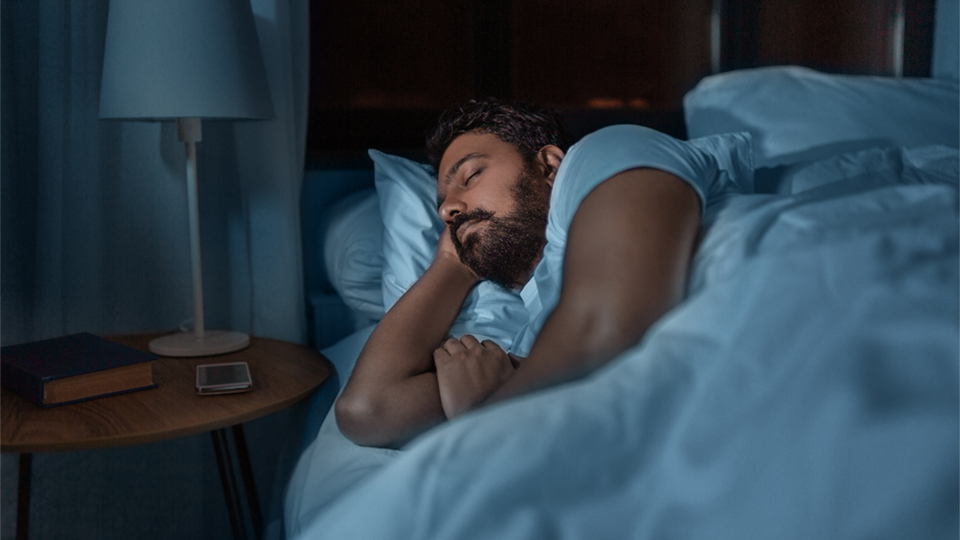How to Tell the Difference Between Nummular Eczema and Ringworm
It’s often difficult to distinguish between nummular eczema and ringworm, so it’s always best to be evaluated by a dermatologist, say experts.

Published On: Feb 25, 2022
Last Updated On: Aug 30, 2023
We all know that melatonin can help you fall asleep. But did you also know that emerging research is exploring whether melatonin can also reduce nighttime itching to help you stay asleep at night?
Melatonin is a hormone mainly produced in the pineal gland in the brain. “Like other hormones, it circulates throughout the body and interacts with the immune system. This helps to coordinate the timing of immune system activity,” said Dr. Anna Fishbein, associate professor of pediatrics (allergy and immunology) at Northwestern University Feinberg School of Medicine. “Melatonin interacts with the immune system via multiple pathways, such as acting as an antioxidant or acting directly on immune cells via melatonin receptors.”
Although our bodies produce melatonin naturally, a melatonin supplement before bed can help provide a sedative effect to fall asleep faster. For people with itchy skin at night, the research shows that the benefits of melatonin may extend beyond simply falling asleep — which could lead to sleeping more soundly, too.
According the March 2020 More Than Skin Deep: Voice of the Patient report, a collaborative initiative within the eczema community to inform eczema research and future treatment development, sleep ranked third among the top three most problematic symptoms (the top two being itch and condition/appearance of skin).1
During sleep, our bodies cycle between four stages: one rapid eye movement (REM) cycle and three non-REM (NREM) cycles.2 It’s common for many people to wake briefly between the cycles. For people with eczema, the pain, dry skin and nighttime itching from a flare is often enough to wake them up and keep them up. This is in part due to the activation of the immune system during a flare, leading to free radical production associated with decreased melatonin levels and depressed antioxidant enzyme activities.3
Temperature can also play a role. At night, our bodies naturally prepare for sleep by cooling our core temperature.4 Melatonin is secreted in a diurnal pattern, or daily cycle, with a steady increase and peak between 2 a.m. and 4 a.m., followed by a gradual decrease.5
Circadian rhythm influences cutaneous blood flow (which determines the amount of heat lost through the skin), among other properties of skin barrier function, which is associated with greater skin permeability, histamine release and — you guessed it — itching.5 Since the skin barrier is most defective, or permeable, at night, this may explain why itching is usually worse at night.
Melatonin has been tested and documented to help fight free radicals and inflammation in our bodies.6 This means melatonin stimulates a series of antioxidative activities within the body, which can help protect skin integrity and maintain a functional skin barrier.6 Since melatonin is a key player in kicking off these anti-inflammatory activities, this is why it’s thought to help reduce eczema flare symptoms that may be keeping you up at night.
Melatonin also helps regulate our circadian rhythm, which in turn regulates immune function. Levels of proinflammatory cytokines (proteins released by our immune cells), such as IL-1β, IL-2, TNF-α, IFN-γ, and IL-6, are increased at night and generally promote sleep.6 The production of these specific cytokines coupled with our bodies’ cortisol secretion at night are thought to contribute to reducing the urge to itch and disrupting a sleep cycle.
In a 2016 study for melatonin supplementation for children with atopic dermatitis (AD) and sleep disturbance, results were evaluated using the Scoring Atopic Dermatitis (SCORAD) index. After melatonin treatment , the SCORAD index among the 48 children included in the study decreased by 9.1 compared to a placebo group.7 The results concluded that melatonin supplements are a safe and effective way to improve the sleep-onset latency and disease severity in children with AD.7
While more research is still needed to determine melatonin’s proven benefits for people with eczema, “It likely works better at managing active flares, as opposed to preventing flares,” said Dr. Fishbein. While melatonin is generally safe for use, some common side effects may include nausea, headaches, dizziness or feeling overly tired or groggy. In comparison, long-term sleep deprivation can have more lasting negative effects on attention, performance, productivity and mood swings, in addition to being associated with higher rates of anxiety, depression and an increased risk for other serious health issues.1
Melatonin is an over-the-counter supplement, available at most drug stores or to order online. There are many different brands and forms of melatonin, or melatonin-containing sleep aids, to choose from. Prices vary depending on quantity and brand, but the most common brands typically run for prices ranging between $7–$12 per bottle for a 1–3-month supply.
Since it’s considered a dietary supplement, melatonin is not as strictly regulated by the FDA. Furthermore, many sleep-aid supplements often include additional natural or synthetic sleep-promoting ingredients, so it’s important to check the ingredients listed and look for a tried and trusted brand. You may ask your doctor or pharmacist for a recommendation based on your needs.
The key is to ensure you’re taking the correct dose: “Melatonin is typically taken every night, about 30 minutes before bedtime with general dosing of 1 mg in infants, 2.5–3 mg in older children and 5 mg in adolescence/adults,” said Dr. Fishbein.
While more research is still needed to determine how nightly melatonin supplements can help reduce flares, they’ve proven to be helpful for many people with eczema who experience sleep disturbances. “Do not be afraid to ask your doctor for a referral to a sleep medicine expert,” said Dr. Fishbein. “Good sleep is really important for physical, psychological and immune health.”
If you find yourself lying awake at night, unable to stop scratching, just know you’re not alone. Melatonin supplements may be a game changer in improving the quality of your sleep.
References: